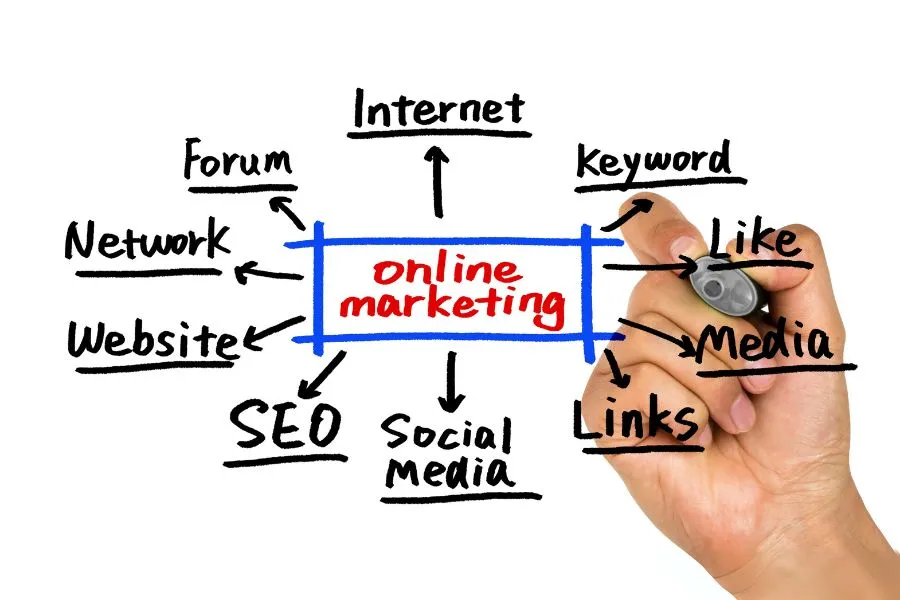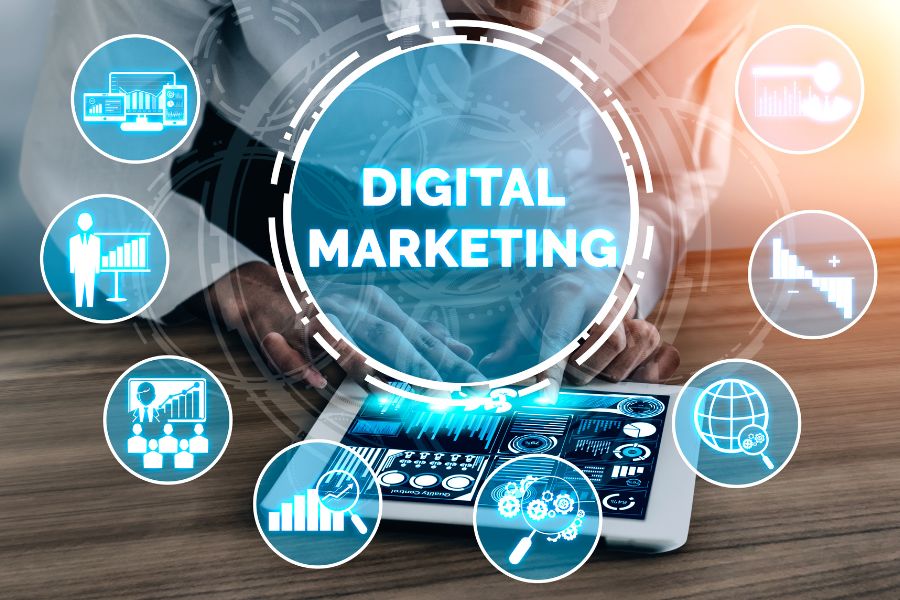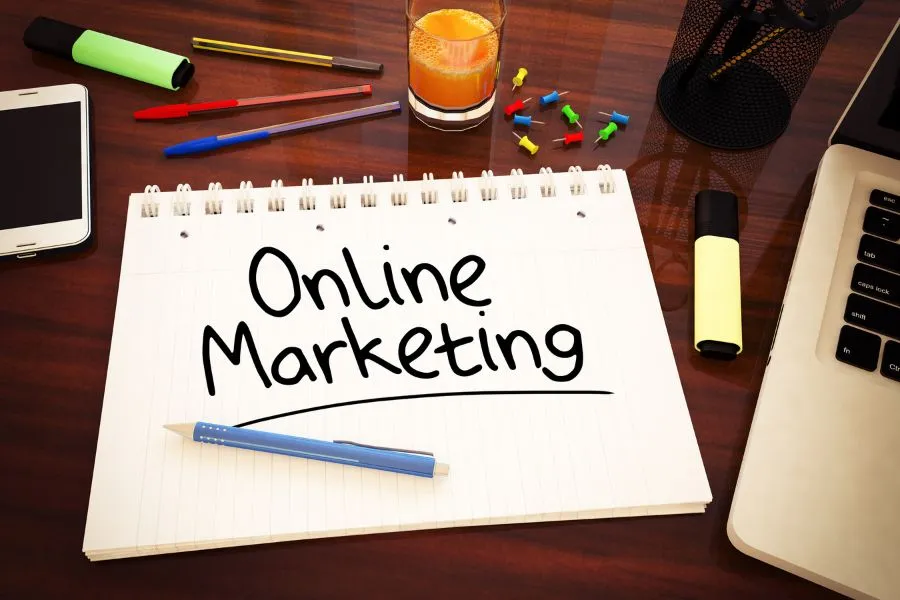Table of Contents
Introduction
In today’s digital age, online marketing has become an essential tool for all businesses. But what exactly is online marketing, and why is it so important? This comprehensive guide will walk you through the fundamentals that how to do online marketing, importance of online marketing, online marketing examples, 5 types of online marketing, challenges for online marketing, and advantages of online marketing for effective online marketing strategy.
What is Online Marketing?

Online marketing, also known as digital marketing, by use of the internet and other digital platforms to promote services or products. This form of marketing includes a wide range of tactics such as social media marketing, email marketing, search engine optimization (SEO), and more. Unlike traditional marketing, which relies on physical media like print and television, online marketing leverages digital platforms to reach a broader audience.
The Importance of Online Marketing
Why is online marketing so crucial for businesses today? The answer lies in its ability to connect with a global audience at a fraction of the cost of traditional marketing methods. With billions of people online every day, businesses have the opportunity to reach potential customers worldwide. Moreover, online marketing offers a level of targeting and personalization that traditional marketing simply can’t match. You can tailor your message to specific demographics, making your campaigns more effective and cost-efficient.
Online Marketing Examples
To better understand the scope of online marketing, let’s look at some key examples:
- Social Media Marketing: Platforms like Facebook, Instagram, and Twitter allow businesses to engage with their audience directly. Whether it’s through posts, stories, or ads, social media is a powerful tool for building brand awareness and driving traffic.
- Email Marketing: By collecting email addresses and sending targeted campaigns, businesses can keep their audience informed and engaged. Newsletters, promotional offers, and personalized content are just a few examples of how email marketing can be used effectively.
- Content Marketing: This involves creating and distributing valuable content to attract and engage an audience. Blog posts, videos, infographics, and podcasts are all popular forms of content marketing.
- SEO (Search Engine Optimization): SEO is the process of optimizing your website to rank higher in search engine results. By naturally adjust relevant keywords, creating good content, and building backlinks, you can boost website visibility.
- PPC (Pay-Per-Click) Advertising: PPC is a model where advertisers pay a fee each time their ad is clicked. It’s a way of buying visits for your website rather than organically. Google Ads is the most popular PPC platform.
5 Types of Online Marketing
Let’s dive deeper into the five main types of online marketing:
1. Social Media Marketing
- Platforms to Use: Facebook, Instagram, LinkedIn, Twitter, and TikTok are some of the top platforms for social media marketing.
- Strategies for Effective Social Media Marketing: Consistency is key. Post regularly, engage with your audience, and use analytics to track performance.
2. Content Marketing
- Importance of Quality Content: High-quality content is essential for attracting and retaining your audience. It should be informative, engaging, and relevant to your target market.
- Content Marketing Strategies: Develop a content calendar, use SEO-friendly keywords, and promote your content across various channels.
3. Email Marketing
- Building and Segmenting Email Lists: Segment your email list based on demographics, purchase history, and engagement levels to send more personalized messages.
- Crafting Effective Email Campaigns: Focus on creating compelling subject lines, providing valuable content, and including clear calls to action.
4. SEO (Search Engine Optimization)
- On-Page SEO: Optimize individual pages on your website by using relevant keywords, writing descriptive meta tags, and improving page load speed.
- Off-Page SEO: This involves activities like backlinking, social media engagement, and guest blogging to boost your website’s authority.
5. PPC (Pay-Per-Click) Advertising
- How PPC Works: Advertisers bid on keywords relevant to their target market. When someone searches for those keywords, your ad may appear at the top of the search results.
- Benefits of PPC: Immediate results, highly targeted traffic, and easy tracking and measurement of your campaigns’ performance.
How to Do Online Marketing Effectively
To succeed in online marketing, it’s essential to approach it strategically. Here’s how:
- Setting Clear Goals: Before launching any campaign, define what you want to achieve. Like increasing brand awareness, generating leads, or boost sales, should have clear goals.
Example: A fitness startup aims to increase brand awareness by 20% in the first quarter.
- Understanding Your Audience: Research your target audience to understand their needs, preferences, and behaviors. This knowledge will help you tailor your messaging and choose the right channels.
Example: A clothing brand creates detailed customer personas based on age, gender, location, interests, and buying behavior.
- Choosing the Right Platforms: Not all platforms are suitable for every business. Select the ones that align with your audience and marketing goals.
Example: A B2B tech company focuses on LinkedIn for professional networking and content sharing.
- Creating a Content Calendar: Planning your content in advance ensures consistency and helps you stay organized. A content calendar will help you map out what to post and when.
Example: A food blogger plans and schedules blog posts, social media updates, and email newsletters for the month.
- Analyzing and Adjusting Your Strategy: Regularly review your performance metrics and adjust your strategy as needed. This might involve tweaking your content, changing your targeting, or experimenting with new platforms.
Example: An e-commerce store tracks website traffic, conversion rates, and customer engagement to optimize ad spending.
Advantages of Online Marketing
Online marketing offers numerous advantages:
- Accessibility and Convenience: With online marketing, your business is accessible 24/7 to a global audience. Customers can browse and shop at their convenience.
- Targeted Marketing and Personalization: Online marketing allows for precise targeting based on demographics, interests, and behaviors, resulting in more effective campaigns.
- Measurable Results and Analytics: Tools like Google Analytics provide detailed insights into the performance of your campaigns, allowing you to make data-driven decisions.
- Flexibility and Adaptability: Online marketing strategies can be easily adjusted to respond to market trends, customer feedback, and performance metrics.
- Increased Engagement and Interaction: Online platforms provide opportunities for real-time engagement with your audience, fostering stronger relationships and brand loyalty.
Challenges of Online Marketing

Despite its many advantages, online marketing comes with its own set of challenges:
- High Competition: The online marketplace is crowded, making it challenging to stand out.
- Keeping Up with Changing Algorithms: Platforms like Google and Facebook frequently update their algorithms, which can impact your strategy’s effectiveness.
- Managing Negative Feedback and Reviews: Negative feedback can spread quickly online, so it’s essential to handle it promptly and professionally.
Conclusion
In conclusion, online marketing is a powerful tool that can help businesses reach new heights. By understanding its importance, exploring different types, and leveraging its advantages, you can create a successful online marketing strategy that drives growth and achieves your business goals. While there are challenges to overcome, the potential rewards make it well worth the effort.
FAQ’s
1. What is online marketing?
Online marketing is the practice of using digital channels like social media, email, and search engines to promote products or services.
2. Why is online marketing important?
Online marketing is important because it allows businesses to reach a global audience, target specific demographics, and measure results effectively.
3. What are the types of online marketing?
The main types of online marketing include social media marketing, content marketing, email marketing, SEO, and PPC advertising.
4. How do you start online marketing?
To start online marketing, identify your goals, understand your audience, choose the right platforms, create quality content, and track your results.
5. How do you measure online marketing success?
Success in online marketing is measured by tracking metrics like website traffic, conversion rate, engagement, ROI, and customer acquisition cost.

